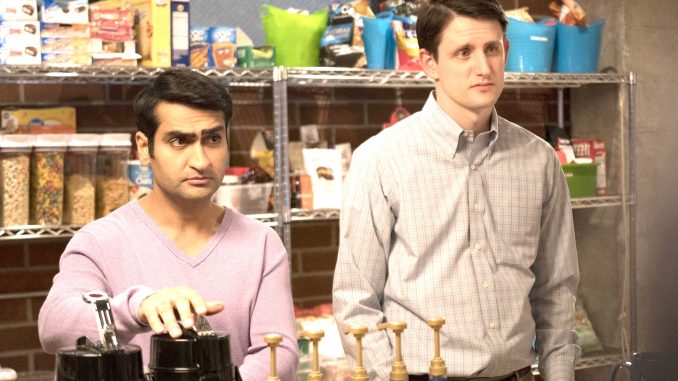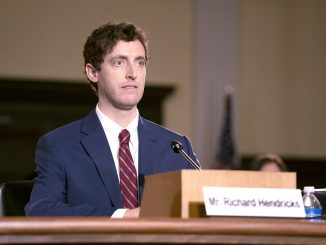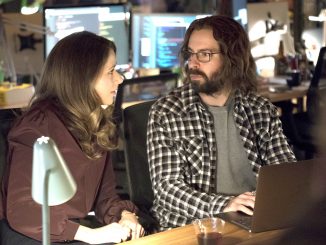
BY JAMIE MORROW
Daily Post Associate Editor
Can you live openly as a Christian in tech? Not in last night’s (April 15) episode of HBO’s “Silicon Valley,” which spends much of its time satirically scolding its startup founder protagonist for outing another founder as one of the faithful. It also takes a moment to skewer Valley denizens who see the creationism of Genesis as ridiculous but are ready to bow down before incoming robot overlords, the soon-to-be overarching artificial superintelligence or whoever really runs the computer simulation that all of humanity occupies.
Jared (Zach Woods), who was promoted to COO in the previous episode, doesn’t mince words when he tells Pied Piper founder and CEO Richard (Thomas Middleditch) that Richard’s outing the founder – of a dating website for gay people – was cruel.
“You can be openly polyamorous and people here will call you brave,” says Jared. “You can put microdoses of LSD in your cereal and people will call you a pioneer. But the one thing you cannot be is a Christian.”
Indeed, the founder himself is initially furious with Richard, telling him that the outing has upended his life and that he’ll be lucky if his parents ever talk to him again, now that it’s public he’s living a lifestyle they consider repugnant. After all, he’s from Palo Alto. They’re happy to have a gay son, but horrified to have a Christian one. Later, he finds himself relieved to be out of the closet.
Valley’s hypocrisy
The show exists to call out the real Valley on its hypocrisy. To find the ruthless capitalism that glides beneath the veneer of “making the world a better place,” as when it highlights the dark side of the gig economy or presents tech billionaires powered more by self-aggrandizement and petty spitefulness than by their lofty rhetoric. This episode attempts to puncture the Valley’s much-vaunted commitment to diversity and inclusiveness by highlighting one group that is supposedly not included.
As usual, Richard’s role in the show is to be the straight man who’s so involved with creating the tech and so wrapped up in his own ideals that he’s been gulled into taking the Valley’s stated values seriously. He didn’t see being Christian as any kind of deal, and he’s been gunning for the openness of his new decentralized Internet platform, so of course he was completely unable to navigate the actual mores.
Even Gilfoyle (Martin Starr) – the show’s Satanist! – says Richard crossed a line. Which was meant to underscore the point, but instead felt like an alien abducted his character and fed him his lines, because Gilfoyle’s signature is his open contempt for anyone or anything he considers wrong.
So while it produced some good laugh lines, that part of the episode overall fell flat. Much like, say, James Damore’s claim that Google fired him for being a white conservative man instead of firing him for producing a sexist rant that could create a hostile work environment for his female colleagues. In an interview last year with CNBC, Damore compared being a conservative at Google to “being gay in the 1950s.” Did that quote inspire this episode? (As for being gay in the 1950s, does anyone remember the sad storyline of Sal Romano in “Mad Men”? Because I don’t think Damore does.)
There are prominent Christians here
While the Valley has plenty of militant atheists, secular humanists and plain old nonbelievers, it doesn’t necessarily follow that Christians are oppressed. I’d certainly be interested to know what former Apple evangelist Guy Kawasaki, VMWare CEO Pat Gelsinger and Electronics Arts co-founder Dave Evans, all prominent Christians, think of the matter.
The one part of the episode where the show’s take on the particular religiosity of the Valley rings true is when Richard, defending the Christian founder to a group of other website developers who are skeptical of being associated with him via Pied Piper, says “Who are we to judge? Right? There are some people out there who believe we’re living in a computer simulation.”
“Well, that is supported by the evidence,” retorts the head of an indie gaming company. Richard then has to leave the room, and the eight 20- and 30-something developers argue about whether we’re in a computer simulation, whether we’ll all just end up working for robot overlords, or whether the world will be ruled by an artificial superintelligence. One says we have to stop the creation of the super AI, and another counters: “We have to bring it into existence. Otherwise it will find out who didn’t believe in it and punish them.” Sinners in the hands of an angry AI?
A different kind of faith
Zuck and Priscilla Chan hope to cure all disease by the end of the 21st century. Peter Thiel, Sergey Brin and many others are investing in long shots for longevity. There’s no lack of faith in the Valley, the only question is what we worship.
Other notes:
• As for the rest of the episode, Jared and Gilfoyle unmask Jeff as Hooli’s mole and Richard tells him he now has to be a double agent and feed Hooli false information. Gilfoyle goes around drilling all of Jeff’s computers, but, it’s implied, what punishment could compare to all the time he’s already had to spend with the desperately uncool and cringy Dinesh?
• Meanwhile, Jian-Yang (Jimmy O. Yang), possessor of all that was Erlich’s, was getting ready to make the Pied Piper guys miserable by holding his 10% stake over their heads. But then Jared uncovers that, due to a mishap, the dim but always lucky Big Head (Josh Brener) is Erlich’s real heir and the true possessor of his house and Pied Piper stake. The episode ends with Jian-Yang apparently having fled to China, taking some kind of copy of Pied Piper’s code with him so he can make a version of the new Internet for the world’s biggest market. Cut to end music, an aggressive-sounding Chinese rap song that Shazam can’t identify.
• Laurie Bream, the uber-rational VC who speaks with extreme precision and has never displayed any emotion whatsoever on the show, reveals that she has been taking medically supervised doses of Ecstasy to manage “severe” post-partum depression.
• I always love the realistic company microkitchens in this show.
Email Jamie Morrow at [email protected].




Christians are OK as long as they keep it to themselves. But when you have a co-worker talking about “Jesus this” and “Jesus that” all the time, it gets old. Work isn’t the place to talk about a person’s personal politics or religion.
That is just as ridiculous as someone saying It’s ok if someone is gay or black just as long as they keep to themselves. The hypocrisy is still there and it’s hilarious. I’m glad that this show brought it out. Reminds me of how “open and accepting” is with all, diversity and all but just mention that you are Republican, Conservative or the like and you get black flagged all over the place.
Excuse you.
Being gay or black is not as the same level of “oppression” as being religious, no matter how much Christians would want to make themselves to the ‘victims’ in here. Who are the ones who come to gay prides or public universities to spread their hatred toward gay people? Who are the ones who deny equality of marriage to others?
The notion of “Christians are a persecuted class of people” is so fake that the only places it’s shown are Fox News and a fking comedy in an alternative reality.
Christians, you can’t call yourself “oppressed” just because gay marriage is now legal, evolution is taught in schools and some people say “Happy Holidays” instead of “Merry Christmas.
That would be Muslims
Do you forget that Christians were thrown to the lions in Roman times? Too far back? How about persecution in North Korea, China and across the Middle East?
Atheists and gays are persecuted in the Middle East, too (both face the death penalty), but I doubt you’d find any Christians protesting that.
I’d also point out that Christianity is hardly oppressed in China. I photographed an entire wall of one bookstore filled with Chinese bibles. There are churches all over China. The ‘oppression’ are any groups–Buddhist, Muslim, Christian, secular–that oppose the party. To make that out to be some special ‘Christian persecution’ is to ignore the larger reality. Buy a newspaper.
This competition regarding who’s the most oppressed is a bit ridiculous.
Why does it even matter? If you want to stay true to your principles, you shouldn’t tolerate any form of oppression, regardless if it’s on gays, Christians or anything.
God is a lie.
This is the Chinese song – 我想要(I Want Remix) 艾福杰尼/BooM黄旭 – https://www.youtube.com/watch?v=40zcNd42InQ
The Bear is Sticky with Honey